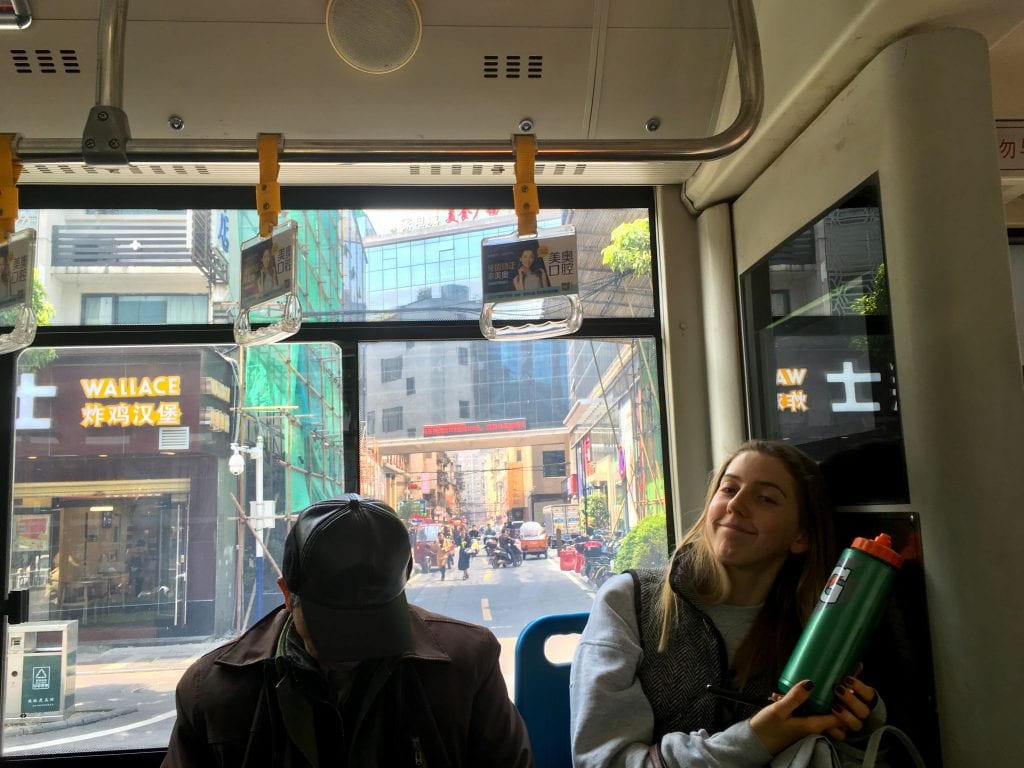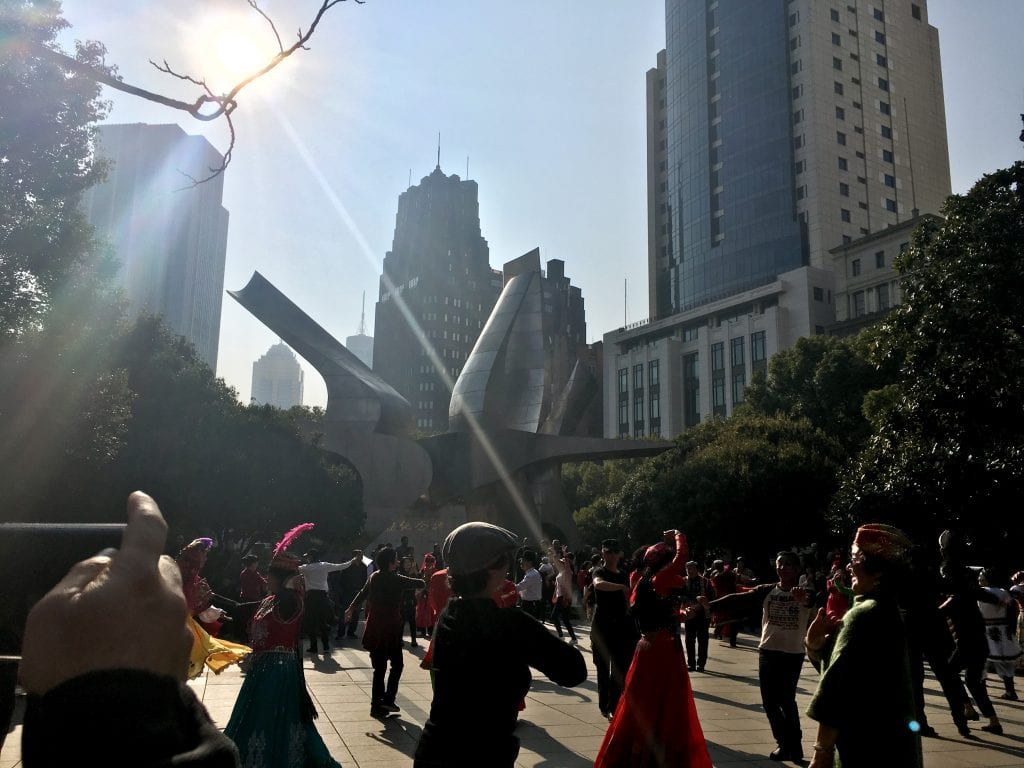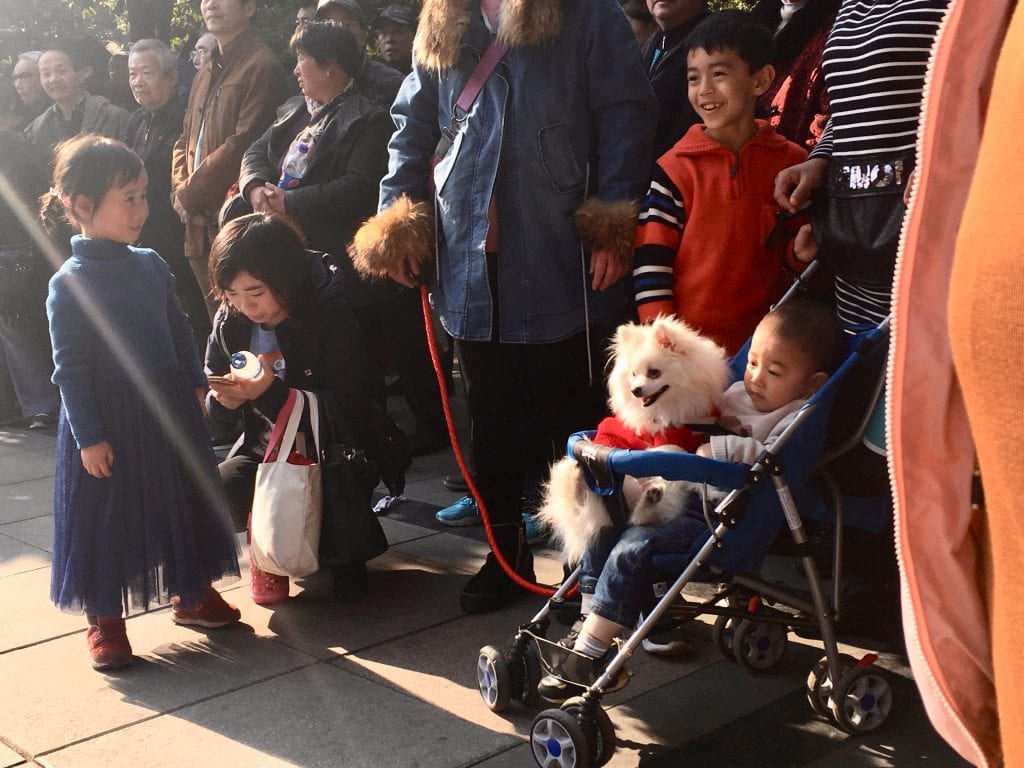By mahaliasmith
In Shanghai, if I am with a group of other international students—especially American ones—, I am typically the individual who appears the most ethnically Chinese or Asian; therefore, whenever a local attempts to speak to the group, he or she generally singles me out and begins speaking (or shouting) energetically in Mandarin, all the while I stand there, hands up in the air, shrugging with confused facial expressions for as long as necessary until a friend steps in who knows slightly more Chinese.
The most enthralling thing to me is how (9.999 times out of 10), even after locals discover I cannot speak almost any Mandarin, they continue to talk (or shout) at me in Chinese. I am not the lone soul this has happened to/continues to happen to, which is even more fascinating in my opinion. I wonder: how many times can you yell at me in Chinese, after which I reply loudly in English, and you yell in Chinese, and I in English, before anything of substance is accomplished? Honestly, probably a lot—I haven't tried that exact method out yet; Google Translate can be one handy tool.
——
Since I am constantly surrounded by millions of Asian people who relay a vague sensation of biological familiarity, yet am also a complete foreigner, I am persistently bound to this intricate feeling of belonging, synchronic to a slight feeling of alienation—unlike anything I have felt in my life—and, I believe it surprisingly makes me feel more human and especially more "American" than ever before.
——
Being an American in China is both a blessing and a curse for me. Even though there are countless local Chinese people living in my surrounding environment, the international community is thriving all the same—especially at Fudan University and my student dorm here. The vast, diverse community of international students combined with the constant support system of 26 fellow George Washington students in my Global Bachelor's Cohort can make it quite difficult to get a foothold in the local Chinese culture, language, and lifestyle.
In an odd way, the situation is somewhat reminiscent of the "foggy bubble" that one tends to fall prey to while studying at GW. However, in order to not become complacent, I find I should do more than just push myself outside of my comfort zone; I must attempt to burst the bubble entirely. I don't mean trying to do anything and everything that might be personally uncomfortable or unsettling, rather, learning to explore and comprehend facets of the world that expand one's own capacity for understanding self, identity, and surroundings.
The act of being in China, being abroad, and studying abroad is truly humanizing for me. Every day, I feel I encounter some new, little (or big) element of life and society that engrosses or engages me in a way that I really enjoy. Being immersed in unique attributes of Chinese culture and heritage has also allowed me to grasp greater appreciation for not only the interconnectedness and interdependency our whole world relies on, but also for the great divergences—further strengthened by the rarity and individuality embraced by every human, identity, community, society, culture, and so on.
——
One differentiation I have noticed is a level of formality encouraged throughout most of Chinese society that starkly contrasts the informality most Americans are familiar with. I believe this is represented in many varying ways; one example is illustrated in the classroom, another in attentiveness to accuracy and efficiency (especially in maintaining accurate public transit arrival and departures times I've noticed).
Nevertheless, there are many contradictions to these cultural aspects as well, such as how, although transit is generally extremely timely and efficient, time as an entity itself is considered more of a suggestion in daily life. It is common to see displays of tardiness or flexibility in deadlines.
Another contradiction to efficiency (or maybe even disregard for problem-solving?) could be showcased through the aforementioned example of a street conversation typical of daily interaction here in Shanghai. I guess I rationalize potentially a million other ways a conversation of more substance could be accomplished ~hence Google Translate~ instead of the usual Chinese favored method of proceeding to yell back and forth in native tongues which each opposing side evidently do not understand and will not gain any stronger comprehension of within the time span of the conversation.
Moreover, even though Chinese society is typically relatively formal, moral, and law-abiding, other parts of life challenge these characteristics, such as ~semi~ disregard for traffic laws. Approaching a large traffic intersection in Shanghai might be one of the wildest city-life phenomena I have seen thus far in life. I'm pretty sure I almost get hit by at least one bicycle, moped, car, and/or bus every day and it's absolutely 110% normal; there's literally NO rhyme or rhythm to it, and if you don't make it.. well you're simply S.O.L.
——
Additionally, the ways in which improvement and betterment for society come across here are quite interesting. I would argue that China was once definitely a communist nation by definition; however, China today (despite being governed by the "Communist Party of China" CPC) is not truly communist, nor capitalist for that matter.
In my opinion, the present Chinese style of government is really just an expression of whatever the government wants it to be. Sure, the style of government originated from German communism, but the modern government simply manipulates its version of "communism" (in conjunction with certain components of capitalism) however it wants, in order to achieve specific goals and aspirations set for China.
For instance, China is currently advancing a new type of "social credit" system, which is structured around personal "Social Credit Scores." In June 2014, a proposal for the system was first issued by the CPC State Council, and ever since, the system has exponentially gained a stronghold in Chinese society; it is projected to be fully implemented by 2020.
——
Here is a link to an article concerning the new system: https://www.marketplace.org/2018/02/13/world/social-credit-score-china-blacklisted
——
The system very generally follows the concept of credit score systems existing in many Western countries, however, additionally produces a plethora of adverse social ramifications. Principally, it embodies a system for social control that comprises someone's credit report through transaction data from huge Chinese private enterprises, including Baidu (China's major search engine), Didi (Chinese Uber), and AliPay (a Chinese mobile transactions app that allows you to pay for almost anything, from private and public transit tickets to groceries and vending machines to gym services to hospital bills; particular services even require individuals to use AliPay [or weChat—another app that includes the mobile transactions feature] to buy goods).
The credit report, combined with supplementary factors such as one's smartphone brand, internet usage, location services and data, behavioral information provided by peers, strangers, and surveillance in one's community (jaywalking, recycling, speeding while driving), denotes one's total social credit score, ranging anywhere from ~300-1000; this score consequently determines access to integral aspects of life such as whether one can borrow money, utilize high-speed transport (planes, trains) or rental services (bike-sharing, car rentals, etc.), and rent or buy property (business, apartment/home).
If someone's score is too low, ~below 300, he or she can be blacklisted from the right to these fundamental features of society until the debt fee incurred due to the "uncivilized conduct" is paid: punishment in the form of figurative and literal social constraints.
On the flipside, someone with a good score, ~above 700, can be rewarded in various ways such as waiving of deposits for rental services and gaining privilege to luxury services (hotels, vacations). Through this, many people could be incentivized to employ the system.
——
To me, the system appears to be a disconcerting reflection of the Black Mirror episode, "Nosedive," in which individual's societal status is completely governed by social media ranking. The episode ends disastrously like a social media nightmare, so time can only tell how this Chinese system will play out.
Furthermore, I find the system resembles a contemporary form of the legalism philosophy of administration during the Qin Dynasty in China. It proves a powerful weapon to be brandished by the Chinese government as a form of control and surveillance that could perhaps lead to stronger enforcement of urban order, a more morally conscious population... or some complete paradox that I don't necessarily want to fathom.
To touch upon my previous thought regarding China's capacity for distinct communism or capitalism, strikingly contrasting realms of black or white do not seem to be a focus of the nation at all. Whether applying capitalist, free-market techniques to foster economic growth, or adversely promoting a shared economy, with attributes such as an extensive social credit system, as a means for collecting nation-wide data and wielding undeniable yet invisible control over society, it seems the nation will do whatever it deems necessary to succeed—no matter the definition of- or meaning behind the action.
——
Although the database composing China's social credit system contains information all government agencies already collect 24/7, such a clear-cut social credit system would be unthinkable to many Westerners. I personally don't think it would be too far off to suggest nation-wide protests or uprisings (public, digital, etc.) would transpire in reaction to such a proposed system in America, for example.
No matter the potential Western incredulity that such a system could come to fruition, for me, the controversy behind China's social credit system epitomizes the value ingrained in realizing such powerful differences across cultures' traditions and norms that continues to drive my passion for cross-cultural, international studies.
——
Whether small or large or radically impactful or unmoving, cultural distinctions such as these nevertheless make me feel ever-more connected to my communities in their uniqueness, and to myself as a human and in my own identity.
The differences, the similarities, the uncertainties, and the changes are what transform life into a reality. I, you, us, WE will never know every aspect of this world and that's how it is meant to be.
We are meant to make mistakes, grow and develop, live partial truths, make our own truths, exhibit and exemplify deviation and individualities. That's what makes life, life—what makes it so compelling in itself.
——
逆来顺受 — Take things as they come.






